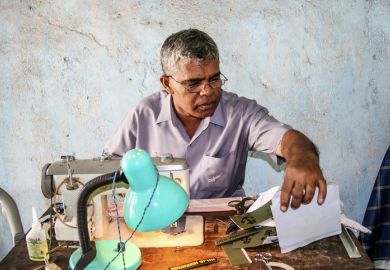The UK should introduce a global talent scheme to attract researchers from across the world post-Brexit, according to a report on how the country can enhance its international reputation after the transition period.
The paper, Future International Partnerships: Putting the UK at the heart of global research and innovation collaboration, published by Universities UK International, says the initiative should fund international academics to pursue blue-sky research in the UK and identify such scholars through independent, internationally recognised peer-review panels.
It suggests that academics awarded through the scheme should be given access to large, long-term competitive grants that are open to unproven or risky ideas, often crossing disciplinary boundaries. It also recommends a variety of funding opportunities to cover a full range of career stages – including PhD candidates, early career researchers and “eminent academics” – and suggests that the awards include dedicated financial support for scholars to bring their families to the UK.
Other countries already have similar schemes. The report highlights initiatives in Singapore, Sweden and Poland. Another example is China’s Thousand Talents Plan, which recruits scientists, engineers and entrepreneurs from overseas, paying salaries and research grants and sometimes providing other benefits such as permanent residency, housing and medical care.
The report also calls for UK Research and Innovation to grow the scale and scope of system-to-system funding agreements with leading agencies from other countries, to cover a greater array of geographical regions and disciplines. Also recommended is an expansion of the “co-investigator scheme”, which is operated by the Economic and Social Research Council, the Arts and Humanities Research Council and the Medical Research Council and provides funding for cross-border research projects. This scheme, the report goes on, should be “mainstreamed” across all competitive research councils to enable more UK researchers to collaborate with overseas scholars. The fund allows researchers to allocate up to 30 per cent of their funding to support the direct costs of an international co-investigator.
Meanwhile, the Centres for Doctoral Training and the Doctoral Training Partnerships run by UKRI should provide more capacity to support internationally collaborative PhDs between UK and overseas universities, and a revised, more strategic version of UUKi’s Rutherford Fund focused on early career researchers should be introduced to boost the international mobility of researchers. The fund provides support for institutions to offer short-term international fellowships.
Dame Janet Beer, vice-chancellor of the University of Liverpool and a key contributor to the paper, said: “At a time when the manifold benefits of international collaboration in scientific research are being daily demonstrated in response to the Covid-19 pandemic, we should seize the opportunity to establish system-to-system funding with a range of developed research economies and work to remove barriers to collaboration at all levels of academic endeavour.”
Register to continue
Why register?
- Registration is free and only takes a moment
- Once registered, you can read 3 articles a month
- Sign up for our newsletter
Subscribe
Or subscribe for unlimited access to:
- Unlimited access to news, views, insights & reviews
- Digital editions
- Digital access to THE’s university and college rankings analysis
Already registered or a current subscriber? Login








